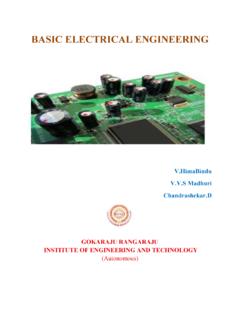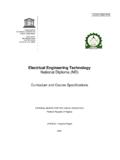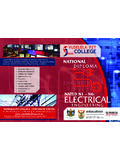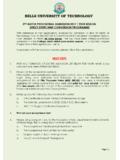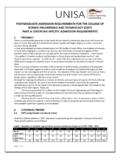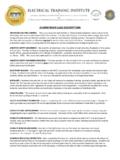Transcription of KOSEN
1 Map of Departments Mechanical Engineering Electrical and Electronics Engineering Asahikawa Control and System Engineering, Information and Telecommunication Engineering Kushiro Chemistry and Biochemistry, Material Science Architecture, Civil and Environmental Engineering Tomakomai Design and Telecommunication Engineering Shipping technology Hakodate Others (Synthetical Engineering) KOSEN Hachinohe National Public Private Akita Ichinoseki Tsuruoka Hirose campus Natori Sendai campus Nagaoka Toyama Fukushima Imizu campus Hongo campus Ishikawa Oyama Gunma Kanazawa Nagano Ibaraki Fukui Yonago Maizuru Gifu Tokyo Matsue Salesio Sangyo-gijutsu Kisarazu Tsuyama Toyota Kobe Numazu Kure Hiroshima Akashi Osaka Suzuka Tokuyama Takamatsu campus Nara Yuge Toba Kitakyushu Ube Takuma campus Oshima Niihama Kinki Univ. Kurume Anan Wakayama Kagawa Sasebo Ariake Oita Kochi Kumamoto Kumamoto campus Matsue Yonago Yatsushiro campus Miyakonojo Tsuyama Kagoshima Kure Hiroshima Ube Kagawa Tokuyama Yuge Takamatsu campus Oshima Takuma Okinawa Niihama campus Anan District of Chugoku & Shikoku Kochi KOSEN .
2 Institute of National Colleges of technology , Japan Main Office: 701-2 Higashiasakawacho, Hachioji-city, Tokyo, 193-0834. Phone. 042-662-3120 FAX. 042-662-3131. Tamachi CIC Office: Campus Innovation Center 4F 3-3-6 Shibaura, Minato-ku, Tokyo 108-0023. Phone. 03-5484-6285 FAX. 03-3453-7023. Rev. 1 2010. 06. A Guidebook for Engineering Education in KOSEN Colleges of technology , Japan " KOSEN " is named from the abbreviation of "Koutou(Superior)," "Senmon (Professional)". and "Gakkou(School)" which applies to Colleges of technology in general. " KOSEN " is well known amongst manufacturing and development companies which support Japan as a top country for science and engineering in the world. We foster creative, practical and professional engineers! KOSEN . Institute of National Colleges of technology , Japan .. A iming to foster creative and practical technical engineers Colleges of technology ( KOSEN ) were first founded in 1962, and since then, about 310,000 students have graduated during the 46 years so far.
3 The Institute of National Colleges of technology , Japan (INCT), which organizes 51 KOSEN . (55 Campuses) including the newly established Okinawa KOSEN , was established in April 2004 as a single legal Yujiro HAYASHI, DR. ENG. entity, and it has become a massive-scale institution which President has approximately 50,000 students and 6,300 academic /. administrative staff. The mission of the KOSEN , which were established in response to a strong demand from industry, is to foster creative and practical technical engineers. In order to accomplish this aim, the KOSEN conduct practical and professional engineering education based on a five-year integrated system with general learning and specialized learning organized systematically. About 60% of students find employment after completing the five-year associate degree course, and 40% of them go on to a two-year advanced course, or transfer to a university and receive a bachelor's degree.
4 Some of them continue their study in postgraduate schools. I am convinced that the variety of career courses after graduation creates many possibilities for their careers, and leads to the production of excellent talents such as practical and creative engineers, entrepreneurs, managers, and researchers, who can be inventive and have problem-solving skills. Receiving extremely high acclaim in personnel training from industry, KOSEN are conducting positive activities in relation to technological innovation from the local community and technology with global competitiveness, and cooperating with industry and government. They are widely admired internationally, not only for the quality of the high-level vocational training they offer, but also for their degree of responsiveness to the needs of Japanese industry, especially the manufacturing sector.
5 [Text omitted] We, like countless other overseas evaluators, were impressed by their management, quality and innovation.. These are remarks of the OECD research committee that investigated the situation of the higher education of Japan in 2006. They expressed great admiration about the education of KOSEN in their report. A big issue of KOSEN in the future is to cultivate global engineers corresponding to the globalization of industry and the higher education. Therefore, each KOSEN is making efforts to enhance substantial activities such as English teaching, overseas internship programs, international exchange of students and staff, and the technical cooperation. Various strategies have been discussed and carried out especially in attempting to expand the acceptance of international students under the plan of Japanese Government aiming at accepting 300,000 international students for the entire educational facility by 2020.
6 I believe KOSEN , which train practical and creative engineers under close cooperation with industry, are able to contribute to students from developing countries and to those countries themselves. KOSEN have played an important role in the economic and technology -based national development in Japan. I am hoping that KOSEN will grow and contribute further as " KOSEN in the world" in the future, and I would appreciate your great support. 2.. Characteristics of KOSEN . Regular Course Accreditation by JABEE as a Five years of consistent engineering education qualified engineering education from 15 years old. program. Possibility of continuing further study in the A wide variety of career courses two-year advanced course. are available after graduation, Curriculum emphasizing scientific from employment to advancing experiments, workshop training and practical to higher level education.
7 Manufacturing skills. A very good reputation both in Small classes, allowing close attention to industry and in academia. students. Detailed teaching and assistance by dedicated teachers. Advanced Course Student dormitory service PBL (Project-Based Learning). Inter-college competitions, such as the Robot on practical engineering tasks. Contest, Programming Contest, Design A long term internship (over a Contest and so on. month) and COOP (cooperative education). International activities, such as teacher and Accreditation by JABEE as a qualified student exchange (470 international students). engineering education program. We, like countless other overseas evaluators,were impressed by their management, quality and innovation.. from OECD* Reviews of Tertiary Education in Japan * Organisation for Economic Co-operation and Development The following is extracted from the original: not only for the quality of the high-level vocational training they offer, but also for their degree of ( first paragraph).
8 Responsiveness to the needs of Japanese industry, There is one notable exception to this portrayal, especially the manufacturing sector. They also which is worthy of note. As Tables 1 and 2 indicate, provide a socially inclusive progression pathway when it comes to KOSEN , of the institutions for students from lower socio-economic groups in and of the students are in publicly funded, Japan. We, like countless other overseas evaluators, national institutions, organised through the Institute were impressed by their management, quality and of National Colleges of technology . They provide innovation. vocational education for those between the ages of 15 and 20, with the possibility of topping up to a ( third paragraph). full degree. They are widely admired internationally, The exception to this is the KOSEN . They are effectively planned and coordinated through the Institute of National Colleges of technology and combine high levels of quality assurance, innovative pedagogy, attentiveness to stakeholder needs (especially employers) and a wide geographical spread.
9 They also provide access to tertiary education from families whose children have traditionally been underrepresented - those from lower socio- economic groups, from rural areas, etc. We believe that the success of these colleges owes something to the mixture of planning at the national level allied to operational autonomy and responsiveness to markets Mission of OECD visit to Matsue KOSEN at the local level. 3.. The KOSEN Internationalization .. Recent activities for further internationalization of KOSEN . Establishment of Center for international students Holding Asian symposium exchange in Okinawa KOSEN in order to study, plan on Ecotechnology . and take actions necessary for promoting international annually, in Japan and other activities of all KOSENs in April 2009. Asian countries. Comprehensive agreement on educational exchange between the Institute of National Colleges of technology and 3 polytechnics in Singapore in September 2009.
10 Introduction of overseas internship program under Cooperation for training teachers in the field of the agreements with Japanese major companies in industrial automation technology at Anatolia vocational March 2009. school in Turkey under JICA project from 2007. Tsuneishi Heavy Industries (Cebu) Inc. Mitsui Phenols Singapore Pte. Ltd. (Philippines) Corporation(Singapore). International Students in KOSEN . KOSEN welcome International Students from various countries as follows: Number of International Students (as of May 1, 2009). MEXT scholarship Malaysian Privately financed Total Regular Advanced Total Regular Advanced Total Regular Advanced Total Regular Advanced Total Malaysia 0 224 224 1 1 224 1 225. Laos 46 46 0 2 2 46 2 48. Vietnam 44 44 0 0 44 0 44. Mongolia 44 44 0 0 44 0 44. Indonesia 38 1 39 0 1 1 39 1 40. Sri-Lanka 16 16 0 0 16 0 16.



